Denisa Tomkova/MSc student of Modern and Contemporary Art: History, Curating and Criticism at the University of Edinburgh/ 30. 5. 2014
Interview was conducted by Denisa Tomkova via email exchange. Translations from Chinese into English/English to Chinese were done by Anran TU.
Tomkova: My dissertation aims to focus on ‘Identity Card’ as my main thesis, to investigate the use of ID cards as visual language by contemporary artists in China and Eastern Europe (this term is here understood politically and historically as an area which experienced communism). Being an Eastern European student in Britain, I feel strongly about the issue of ID cards personally, individually and collectively. In my research, I noticed that some Eastern European artists also adopted ID cards for their art works and performance, which echoes your work in 1998. Therefore, I would very much like to learn more about your motivation and concept when creating works as such. Thank you for agreeing to be interviewed, I deeply appreciate your kindness.
目前我的研究論文主題為以作出發(fā),希望探討中國以及東歐的一些藝術(shù)現(xiàn)狀與藝術(shù)對社會與政治的反思。作為在英國求學的東歐人,我能親身感受到身份證明的問題,不管是就個人還是集體而言。而我也在研究時注意到,有幾位東歐的藝術(shù)家,不約而同用身分證作了一系列的相關(guān)創(chuàng)作。也與您的1998作品 相呼應。于是我很希望能夠多了解您的作品內(nèi)涵與動機。我深深感謝您百忙中接受我的訪談,如果有詞不達意的地方,請多見諒。
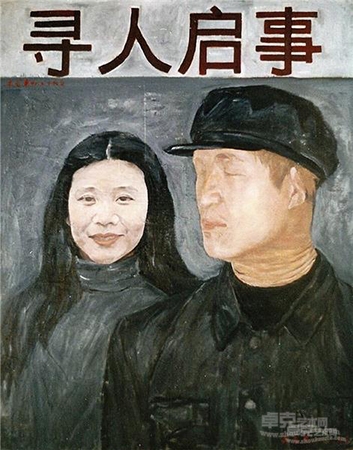
朱發(fā)東 《尋人啟事》9
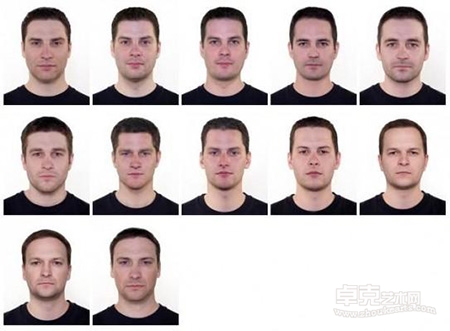
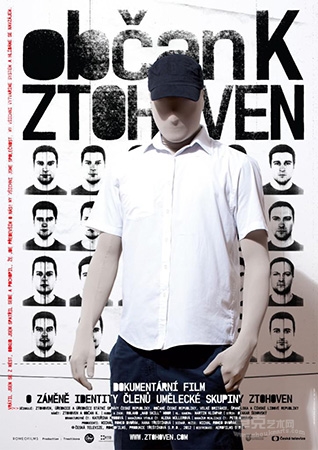
Ztohoven, Citizen K (ID cards), Czech Republic, 2009 – 2010

Tanja Ostojic, Looking for a Husband with a EU Passport, Serbia, 2000-2005
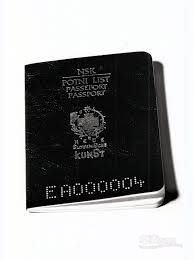
NSK (Neue Slownische Kunst), Passport, Slovenia, 1993

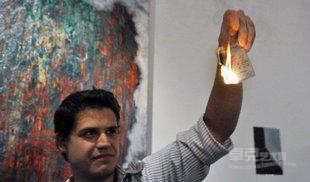
Martin Mihalec, Exhibition opening Hangover – artist burned his ID card, Slovakia, 2011
Email conversation with Zhu Fadong
From**To zhustudio@126.com 26 May, 2014
Dear Mr Zhu Fadong,
I am a Postgraduate student at the University of Edinburgh, currently working on my dissertation on ID Cards and Surveillance in Art based on examples from China and Eastern Europe.?Would you be willing to answer some of my questions regarding your work?
And in particular on your works: Identity card from 1998 and This Person if For Sale from 1994?
I would really appreciate your help.
Thank you in advance
All the best,
Denisa Tomkova
zhustudio@126.com 7 Jul 2014
Dear Denisa Tomkova
Please excuse me for the late reply. ?
I also have a strong feeling for the discrimination towards Eastern European immigrants from Western European world. I remembered in 2004 when I was invited to visit Switzerland, during my stay there, my wife and I always went out early and returned home very late. When we got down at the bus station, a middle-age man always came to us and asked us to show him the way. Everyone kept implying us: 'say no to him!'?The middle-age is a immigrant from Eastern Europe. My wife and I didn't take their advice and said 'yes' to him, and we got alone very well.?
Ztohoven This straight-forward and heart-stirring work of Ztohoven is very well-known. Also, I have heard about NSK's works quite early (In 1996 my friend Ma Liuming had met them on a performance art festival. For me your question are too critical to answer, but I really appreciate these challenging questions. I would concentrate on them today and tomorrow. Thank you very much! ?
Speak to you soon,
Best wishes!
Zhu Fadong?
** 19 July 2014
Dear Mr. Zhu Fadong,
Thank you again for your time to answer my interview questions, which are very important for my dissertation research. Thank you very much for your cooperation.
I would like to ask you the following questions:
1 Are there still people applying for your IDs?
2 Do people?use these cards as a real identification?
3. Do you document somehow this your art project? As the most of the art examples I am discussing in my paper are performances they require certain documentation in regard to be seen and present to public. I am curious how do you approach this problem.
Thank you very much indeed.
Kind regards,
Denisa Tomkova
** to zhustudio
1. Identity card work was inspired by the fact that people from other provinces need to apply for temporary resident card came when they want to come to Beijing. Could you explain it to me more though? Have you used it as a real ID or have you considered it as art?
zhustudio@126.com 20 July 2014
Question 1: You are right. My work 'identity card' is inspired by the situation that every adult living in mainland China should possess an identity card.?
What's more important is the residence information (note: there is a specific term in Chinese 'Hukou' or more specific 'Huji zhidu', comparable to the residence permit in the UK or other countries but somewhat different, you can google it if you want to know more) correspond to your identity card. That is to say, no matter where you are, when you are in the big cities like Beijing, Shanghai or Guangzhou, when you show your identity card, your residence information will be exposed. It is impossible for common people to change the situation.?
My work is the response to these inequality and discrimination within the system. I am responding as a Chinese citizen, as well as an artist! I hope the Chinese could have the right and freedom to immigrate (to other cities), as it is one of the most basic human rights!
From ?zhustudio@126.com 27 July 2014?
Ok, now I will answer the latest questions, and then previous questions you asked before.
1,Now there is scarcely anyone (asking for the identity card). But there is a gallery which hoped to represent the work exclusively, and many people have applied for the work.
2,It seems to me there wasn't. But someone (whom I can't remember) said to me that he showed the 'identity card' to the Chinese custom official, and the official was stunned...
3,Since 1998, there have been hundreds of people applied for the 'identity card', including those who involved in the art world and art lovers, such as artist, collectors, gallerists, critics and curators, as well as those who encountered the art by incident. They are from mainland China, Hong Kong, Taiwan and all over the world.?
From the beginning, I have kept all the original documents related to the 'identity card', including the proposal, application form, dates of receiving the application and making the card. The whole project was invited to exhibitions for several times; some cards and application forms were auctioned online through 'Zhaoonline.com'. (See the picture enclosed, I will send to you later)
Ok, that's all for today. See you next time!
Best wishes!
Zhu Fadong
E-mail conversation was originally conducted in Chinese. Here is the original version:
在 May 26, 2014,22:17,denisa tomkova > 寫道:
朱發(fā)東, 我是一名研究生就讀於愛丁堡大學。 我目前的工作對我的論文對中國和東歐的當代藝術(shù)家的工作與身份的工作。 我很好奇,如果有可能問你一些問題關(guān)於你的工作身份證自1998年和這個人如果出售自1994年?
朱發(fā)東工作室?zhustudio@126.com 7 Jul 2014
Dear Denisa Tomkova
對不起,現(xiàn)在才給你回復,望諒。
你提及西歐社會對來自東歐移民的歧視,我也深有感悟。那是2004年,我應邀訪問瑞士,在瑞士小住的那段時間里,我
時常與夫人早出晚歸,每當從火車站乘坐公交車下車,返回住處時。常會有一個中年男人迎上前來,比劃著要幫我們帶路,周圍的人不斷的向我們暗示:“對他說No !”。
這個中年男人正是東歐移民,我和夫人完全沒有理會旁人的勸告,對他說了Yes!雙方相處的很融洽友好。
Ztohoven 這張很直白振憾人心的作品很著名。另外,NSK他們的作品,我很早就聽說(我的朋友馬六明大概在1996,年左右,曾和他們在一個行為藝術(shù)節(jié)
相遇。
你的問題實在是太狠了,讓我很難回答,不過我喜歡有挑戰(zhàn)的問題,今明兩天我蔣集中經(jīng)歷回答你的問題,謝謝你!
待續(xù),
祝好! 朱發(fā)東 Zhu Fadong
denisa tomkova?** 19 July 2014
to?zhustudio
尊敬的朱發(fā)東先生,
您好!
再次感謝您騰出時間來回答我的采訪,這對我的研究和論文的完成非常重要。
非常感謝您的配合。
我還有以下問題想要向您請教:
1. 現(xiàn)在還有人申請您制作的‘身份證’嗎?
2. 會不會有人把這些身份證當做真正的身份證來使用?
3. 請問您會為這一作品作些歸檔整理?因為我研究的其他作品很多都是表演藝術(shù),所以藝術(shù)家們會將其整成檔案資料以便向公眾展示。我想知道您是如何處理這一問題的。
再次感謝您的配合與協(xié)助。
Denisa Tomkova
denisa tomkova?** to zhustudio
1.您的作品 工作的靈感來自于一個事實,即從其他省份的人需要申請臨時居民卡來了,當他們要來北京。對于利用身分證這個既有的形式與格式,你有沒有把它作為一個真正的身份證或者您對于藝術(shù)的界定,以及藝術(shù)家角色的界定為何嗎?
From zhustudio@126.com 20 July 2014
問題1:沒錯,我的【身份證】作品靈感來自于中國大陸每個成年人都必須持有的身份證,
但更重要的是這個身份證所顯示的內(nèi)容對應著后面的戶口信息。也就是說無論你現(xiàn)在是在北京、上海還是廣州等大城市,只要你出示身份證,馬上就會暴露你的戶籍,你不屬于你現(xiàn)在生活的這座城市,而要改變這一狀況,對于普通大眾來說,幾乎是不可能的。
我的作品就是對這些不公與歧視的體制所做的回應。這是作為一個公民的回應,也是作為一個藝術(shù)家的回應!希望中國人也能享有遷徙自由,因為這只是一項最基本的人權(quán)!
From ?zhustudio@126.com ? 27 July 2014
好吧,先回答你最新提出的問題,下次再接著回答你之前的問題。
1,現(xiàn)在基本沒有了,但有一家畫廊希望獨家代理這件作品,已經(jīng)有多人向該畫廊表示想申購此作品。
2,好像還沒有,但過去曾有人對我說(是誰記不住了):他曾在入境時向中國海關(guān)
出示過此【身份證】,據(jù)說當時海關(guān)人員愣住了……。
3,我的【身份證】作品,自1998至今,已經(jīng)有包括中國各省及中國香港、臺灣還有世界很多國家的,與藝術(shù)相關(guān)的人士、以及熱愛藝術(shù)的人們,包括藝術(shù)家、收藏家、畫廊主、批評家、策展人等等,再就是還有一些因種種原因與藝術(shù)不期而遇的人們申購,現(xiàn)在持有我【身份證】作品的人已經(jīng)有好幾百人了。
我的【身份證】作品從一開始至今,所有與作品相關(guān)的原始
文案、申請表格、填表日期、制證時間等等,都有完整的記錄和歸檔保存,并且所有這些都被我視為作品項目的一部分。該項目曾應遨完整的展出過幾次,有的單個作品及申請表還被電商【趙涌在線】在網(wǎng)上公開拍賣。(見附圖,回頭
給你發(fā))
好了,今天就到這,下次再見!
祝好!
These are all the original questions:
1. Identity card work was inspired by the fact that people from other provinces need to apply for temporary resident card came when they want to come to Beijing. Could you explain it to me more though? Have you used it as a real ID or have you considered it as art?
您的作品 工作的靈感來自于一個事實,即從其他省份的人需要申請臨時居民卡來了,當他們要來北京。對于利用身分證這個既有的形式與格式,你有沒有把它作為一個真正的身份證或者您對于藝術(shù)的界定,以及藝術(shù)家角色的界定為何嗎?
2. Do you find the situation with identity cards still the same? If not what has changed?
你覺得在當今的情況下你是否會再創(chuàng)作同樣的作品? 你覺得關(guān)于的情況 在近些年是否還相同?如果不是,發(fā)生了什幺變化?
3. In the interview in 2010 you said that around 100 got identity cards, have there been any more people since then?
在2010年的采訪中你說,大約100人已經(jīng)拿到身份證,目前2014年的情況如何? 是否也反應政策或是城鄉(xiāng)的差距?
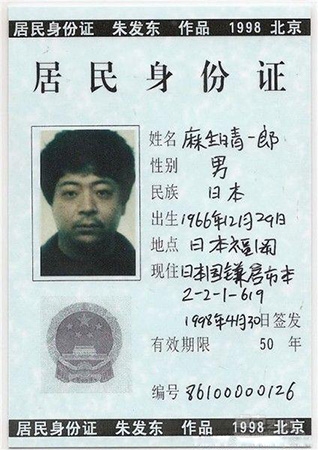

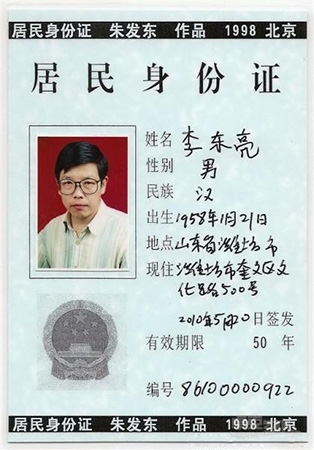
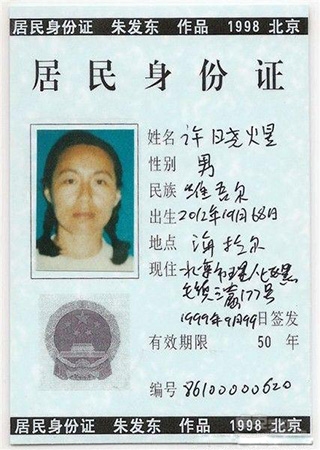
4. What does in general national identity card mean to you? Does it represent any political ideology to you?
對于你來說,身份證意味著什幺?它是否代表了政治意識形態(tài)或是你對現(xiàn)有體制的看法?
5. Your first performance was Looking for a Missing Person in 1993 and then Missing Person Announcement, 1993, This Person is For Sale (Negotiate Price on Spot). Before starting with performance you were practicing painting why did you shift to the performance art? When did you feel the need?
你的第一個行為藝術(shù)是1993年的 然后是Missing Person Announcement, 和 This Person is For Sale (Negotiate Price on Spot)。是什幺讓你開始從油畫創(chuàng)作轉(zhuǎn)向了行為藝術(shù)的創(chuàng)作?你是什幺時候感到這種轉(zhuǎn)變的需要的?


6. How would you describe your practice?
你會如何形容你的藝術(shù)主張或是有任何理論的實踐?你最終想要表達的是什幺?
7. Do you think art has a capacity to stimulate the discussion in the society? Comparing with two to three decades ago, what’s your opinion on the Chinese art now? What are the challenges and predicament for the contemporary Chinese artists, in your opinion?
你認為藝術(shù)有能力激發(fā)社會的討論嗎?您對于目前中國藝壇的現(xiàn)況,今昔之比,有什么評價與看法?您認為對于中國當代藝術(shù)家有哪些挑戰(zhàn)與困境?
8. In regard to your work VISA, you talked about the difficult situation as a Chinese travelling to the Western countries. Do you find the topic of identity cards and situations on VISAs and the tightened immigration policies reinforced by Western countries (mainly Europe and North America) somehow could be relevant? Why are you interested in political and migration related topics? When you work on pieces like ‘Identity Crad’, do you have any art market or buyers in mind, or they are not your concern?
關(guān)于你談到出國時的工作簽證的情況時,作為一個中國人你旅行到西方國家,身份證和簽證的話題主題是否相關(guān)?為什幺您對于這些政治與移民的主題發(fā)生興趣?@腌您創(chuàng)作像身分證或是其他有爭議性政治性作品時,是否也曾考慮過市場?或者買家與市場不是您的主要考量了?
9. Your artworks Identity card as well as Looking for a Missing Person and This Person is For Sale seem quite political to me, like kind of revolt against something. Is it correct? If yes can you tell me more about it please?
你的作品Identity card,Looking for a Missing Person 和This Person is For Sale 在我看來極具政治意味,它們好像在反抗著什幺。我是否可以這樣理解?如果是的話,你能告訴我更多關(guān)于它們的信息嗎?還是這代表您對變遷中的中國社會的看法?
10. When many contemporary Chinese artists tend to stress on ‘ Chineseness’ and ‘Chinese Identity’ and ‘Chinese elements’ for their art to cater for the market, what’s your view on this? Would you tend to choose a global issue to suit the fashion of globalisation and for exhibition works abroad? What are the challenges you encounter when exhibiting works for international audience, and how are they different from domestic audience in China?
當許多當代藝術(shù)家都使用中國式的符號以適應現(xiàn)今的藝術(shù)市場,您對于此現(xiàn)象有如此看法?您會比較傾向去中國化來達成全球性藝術(shù)?還是在選取題材上,你會傾向選取全球性議題作考量,以作為到國外展覽所需?您認為國內(nèi)跟國位展覽有什么不同與挑戰(zhàn)嘛?






 皖公網(wǎng)安備 34010402700602號
皖公網(wǎng)安備 34010402700602號